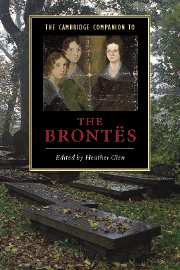Book contents
- Frontmatter
- Introduction
- 1 The Haworth context
- 2 'Our plays': The Brontë Juvenilia
- 3 The poetry
- 4 'Three distinct and unconnected tales': The Professor, Agnes Grey and Wuthering Heights
- 5 'Strong family likeness': Jane Eyre and The Tenant of Wildfell Hall
- 6 Shirley and Villette
- 7 'Getting on': ideology, personality and the Brontë characters
- 8 Women writers, women's issues
- 9 The Brontës And Religion
- 10 The Brontë myth
- Further reading
- Index
- Series List
7 - 'Getting on': ideology, personality and the Brontë characters
Published online by Cambridge University Press: 28 May 2006
- Frontmatter
- Introduction
- 1 The Haworth context
- 2 'Our plays': The Brontë Juvenilia
- 3 The poetry
- 4 'Three distinct and unconnected tales': The Professor, Agnes Grey and Wuthering Heights
- 5 'Strong family likeness': Jane Eyre and The Tenant of Wildfell Hall
- 6 Shirley and Villette
- 7 'Getting on': ideology, personality and the Brontë characters
- 8 Women writers, women's issues
- 9 The Brontës And Religion
- 10 The Brontë myth
- Further reading
- Index
- Series List
Summary
This chapter places the Brontë narratives in three intersecting contexts: the changing social circumstances in which their work appeared, the changing literary context in which works of narrative were created and understood by Victorian people, and certain ideological factors which unite these two. The key term is 'character', and here we need to distinguish two quite separate meanings. There is, first, the modern sense of character as the literary depiction of psychologically complex personalities. But there is also a Victorian sense of character (hereafter designated 'character') as a desirable moral quality. I will argue that the Brontë novels were written at a point in literary history when the modern 'psychological' understanding of character emerged as a significant criterion in the judgement of fiction, and a more open enquiry into the nature of human behaviour contested moral orthodoxies. The tussle between the two engages key issues: what is the private cost of public image? What pressure does the ideological environment exert on personal behaviour? How can writers of fiction represent the contest between them?
To be thought to be ‘of good character’ was, in most circles of the literate population of Victorian Britain, an absolute requirement of those entering employment.It was also essential for those entering respectable marriage.
- Type
- Chapter
- Information
- The Cambridge Companion to the Brontës , pp. 148 - 169Publisher: Cambridge University PressPrint publication year: 2002



